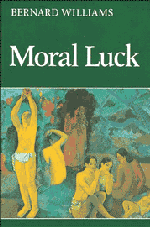Book contents
- Frontmatter
- Contents
- Preface
- Acknowledgements
- 1 Persons, character and morality
- 2 Moral luck
- 3 Utilitarianism and moral self-indulgence
- 4 Politics and moral character
- 5 Conflicts of values
- 6 Justice as a virtue
- 7 Rawls and Pascal's wager
- 8 Internal and external reasons
- 9 Ought and moral obligation
- 10 Practical necessity
- 11 The truth in relativism
- 12 Wittgenstein and idealism
- 13 Another time, another place, another person
- Frontmatter
- Contents
- Preface
- Acknowledgements
- 1 Persons, character and morality
- 2 Moral luck
- 3 Utilitarianism and moral self-indulgence
- 4 Politics and moral character
- 5 Conflicts of values
- 6 Justice as a virtue
- 7 Rawls and Pascal's wager
- 8 Internal and external reasons
- 9 Ought and moral obligation
- 10 Practical necessity
- 11 The truth in relativism
- 12 Wittgenstein and idealism
- 13 Another time, another place, another person
Summary
There has been a strain of philosophical thought which identifies the end of life as happiness, happiness as reflective tranquillity, and tranquillity as the product of self-sufficiency – what is not in the domain of the self is not in its control, and so is subject to luck and the contingent enemies of tranquillity. The most extreme versions of this outlook in the Western tradition are certain doctrines of classical antiquity, though it is a notable fact about them that while the good man, the sage, was immune to the impact of incident luck, it was a matter of what may be called constitutive luck that one was a sage, or capable of becoming one: for the many and vulgar this was not (on the prevailing view) an available course.
The idea that one's whole life can in some such way be rendered immune to luck has perhaps rarely prevailed since (it did not prevail, for instance, in mainstream Christianity), but its place has been taken by the still powerfully influential idea that there is one basic form of value, moral value, which is immune to luck and – in the crucial term of the idea's most rigorous exponent – ‘unconditioned’. Both the disposition to correct moral judgment, and the objects of such judgment, are on this view free from external contingency, for both are, in their related ways, the product of the unconditioned will.
- Type
- Chapter
- Information
- Moral LuckPhilosophical Papers 1973–1980, pp. 20 - 39Publisher: Cambridge University PressPrint publication year: 1981
- 228
- Cited by



